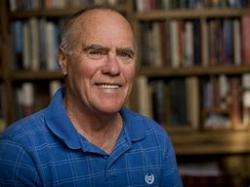That includes the language we use. As a new season of high school sports is set to begin, let’s dedicate ourselves to language that befits public use.

Courtesy: The Trinity Forum
The year 1946 is special for me, as is 1949. In 1946, George Orwell published his essay, Politics and the English Language, in which he demonstrated how poorly written language of his era influenced its politics. In 1949, Pastor Howard Thurman published Jesus and the Disinherited to show how culture treated the poor and outcast. Oh, yes, the other event of 1946 is my birth, that happened over seven decades ago.
Jesus, in my reading of the Gospels, never uses crude or vile language. Yes, He does call the Pharisees “a nest of vipers,” but just as He is with the Samaritan woman at the well, the rich young man, Legion, and so many others, His language is direct, firm, but always reassuring. In Matthew 5:22, Jesus does not use the word raca (that is, empty-headed or foolish) but says it to make His point concerning prejudice.
Orwell warns us that our language has a strong and direct influence on our thinking, and thinking (of course) connects to what we believe and how we act. If we use common words, trite words, or gross words, we will soon mimic those ways in our behavior. If a coach or teacher uses crude language, then she or she will eventually think and act crudely, too.
Worst of all, athletes and students will imitate, reducing the entire team or class to a crude level. Who wants that? I don’t. If teachers and coaches want a “well-oiled machine,” then crude language will introduce sand into the gears.

Courtesy: MarketWatch
Back in 1949–when Pastor Thurman wrote his book–segregation was the norm. Of segregation he writes, “Most of the accepted social behavior-patterns assume segregation to be normal—if normal, then correct; if correct, then moral; if moral, then religious. Religion is thus made a defender and guarantor of the presumptions.”
That which is viewed as ‘normal’ can be wrong, as we see clearly through today’s eyes. But what of our times and our “accepted social behavior patterns”? What about a team that has a tradition of hazing younger members of the class? Like our language, our social behavior rules our beliefs—whether we are Christian, Muslim, agnostic, or none of the above. If we do it, it is ‘normal,’ and thus right.
I identify with both Orwell’s essay and Thurman’s book because I grew up in segregated, Southern society. It was my norm, just as the Baptist church, Plant 1 cotton mill and the mill hill, little money, lots of love, and few possessions were. Like all lives, it was what I knew, so it was my normal. But as I grew and my horizons expanded by college and travel, I saw tears in the fabric of my earlier life.
It all came in stages. I saw race differently. Then, I began to argue for social justice. Eventually, I returned to religion.

Courtesy: Metro
When I was an educator, I was known for being strict because I was. I did not abuse my students or athletes, and they all worked hard. I believe in work as the way to improve whether you are reading Homer or learning a single-leg takedown in wrestling.
I told wrestlers that losing the right way was better than winning the wrong way. Students who did not read the assigned lines from The Odyssey copied them that night at home. I was tough without using what I call “wordy dirds.” Never. Not from me or my charges.
I believe it’s a privilege to share knowledge with young people whether it on a mat, on the field or in a classroom. As teachers, we should do our best to elevate our charges. Good language and team traditions will do that.
Just try it … this year.














